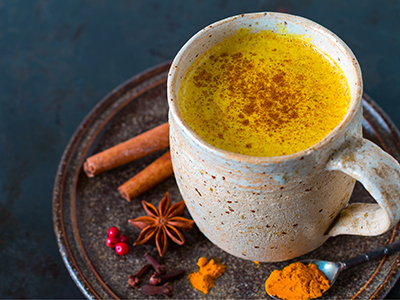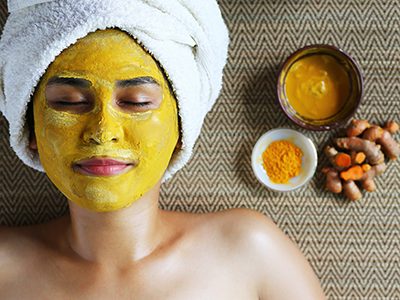27 Sep The Health Effects of the Sun-Drenched Turmeric Spice
 This sunlight-coloured spice has been used for over four millennia in the Indian subcontinent, a staple spice in the Vedic culture in India, not only for its ability to produce vibrant and delicious food, but also because of turmeric’s (or haldi in Hindi) extensive list of medicinal achievements. With its potent antioxidant and anti-inflammatory properties, turmeric is used in various ways. Turmeric is used in cooking, in Indian medicinal home remedies, in Hindu rituals, in skin products, and more recently, has appeared in turmeric lattes around the country.
This sunlight-coloured spice has been used for over four millennia in the Indian subcontinent, a staple spice in the Vedic culture in India, not only for its ability to produce vibrant and delicious food, but also because of turmeric’s (or haldi in Hindi) extensive list of medicinal achievements. With its potent antioxidant and anti-inflammatory properties, turmeric is used in various ways. Turmeric is used in cooking, in Indian medicinal home remedies, in Hindu rituals, in skin products, and more recently, has appeared in turmeric lattes around the country.
Turmeric lattes, often promoted as a soothing, nourishing, caffeine-free hot drink, have formed their own cult following as a healthy alternative to coffee. That being said, ‘Golden Milk’, or Haldi Doodh, has been a comforting, immune-boosting home remedy in the South Asian region for centuries, often given to sick children or adults and pregnant women. Haldi Doodh is traditionally made by warming up cow’s milk with (fresh or powdered) turmeric and other spices, such as cinnamon and ginger, as well as the all-important black pepper, which helps our bodies absorb all the goodness to be found within this vivid, ochre-coloured spice.
“One Who is Victorious Over Diseases”
Turmeric, after years of anonymity in the Western world despite being beloved in South Asia, has recently become the centre of much scientific research to unearth the full extent of turmeric’s health benefits. Curcumin, a compound found within turmeric which gives it its bright hue, receives the most adulation for its impressive antioxidant and anti-inflammatory powers, powers which are responsible for turmeric’s never-ending health benefits. Antioxidants are compounds that fight cell damage and are therefore essential for the functioning of our cells. It has been proven that a diet rich in antioxidants may help to lower the risk of disease.
Moreover, chronic, low-level inflammation is thought to play a major role in almost every chronic, Western disease , including cancer, Alzheimer’s, diabetes, rheumatoid arthritis, osteoarthritis and heart disease. Therefore, diets rich in anti-inflammatory compounds, like Curcumin, are of potential importance in preventing, and even treating, these diseases. Turmeric appears to live up to one of its many Ayurvedic names, Jayanti, meaning “one who is victorious over diseases”.
 Hindu Weddings
Hindu Weddings
In addition to all the health benefits explored above, turmeric plays an auspicious role in Hindu wedding ceremonies and rituals, signifying purity, fertility and good health. Interestingly, turmeric is also highly beneficial for your skin. During the pithi, or the haldi ceremony, which marks the beginning of the wedding rituals, the bride and groom are surrounded by their family and are covered in a turmeric-infused paste. Once the turmeric is washed away, the couple’s skin is left ‘glowing’ in health, an old Indian beauty treatment that ensures the couple look radiant and wonderful on their wedding day. Just like any effective exfoliating agent, turmeric removes all the dead skin cells to reveal rejuvenated skin. Furthermore, turmeric is thought to work as a mild anti-depressant, and so when massaged into the skin, acts to relax the body, and ease any wedding day anxiety and jitters.
 Turmeric and Self-Care
Turmeric and Self-Care
Turmeric has recently become an important ingredient for Western self-care routines, with its ability to produce a natural glow on our skin becoming more well-known through an abundance of face masks containing this special spice. As an exfoliant, turmeric is said to reduce the appearance of dark circles under the eyes, as well as acting to sooth any dry skin you may have. Turmeric’s strong antioxidant quality has also found to improve damage to the skin caused by the sun, as well as the ability to slow the effects of ageing on the skin.
There has also been further research into the effects of turmeric in alleviating skin conditions, such as psoriasis and acne, as well as relieving the appearance of acne scars or stretch marks, because of its powerful anti-inflammatory characteristic. Although there are still not enough studies to provide conclusive evidence on whether turmeric is effective in tackling skin conditions, interest in such studies is increasing.
As you can see, turmeric has an impressive repertoire in terms of making us healthier and helping us keep our skin healthy as well!



Sorry, the comment form is closed at this time.